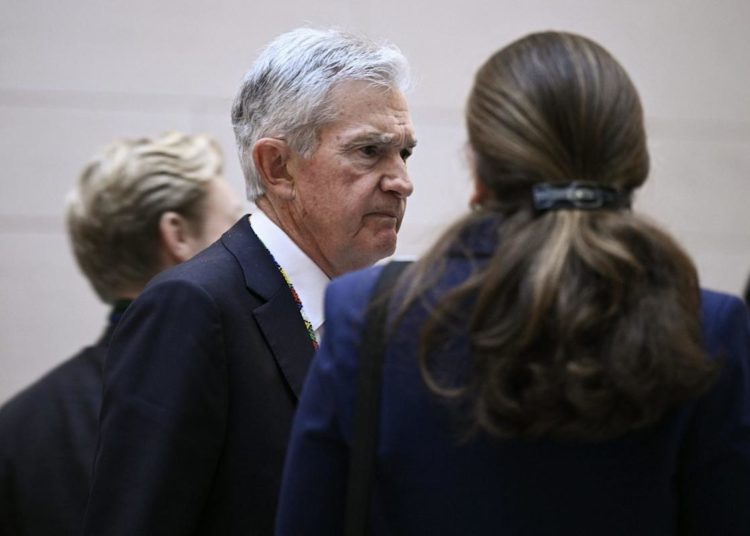As Harvard University students hunker down for spring semester finals, dozens of students rallied on campus on Tuesday urging the school’s leadership to hold firm in their fight with the Trump administration.
It was the latest public display of support the Harvard community has shown following the school’s rebuke of the White House.
“We are all very proud of the administration for the way it has stood up against the Trump administration – and stood strong,” said sophomore Caleb Thompson, co-president of the Harvard Undergraduate Association.
Last month, Harvard publicly rejected demands for policy changes that impacted academic freedoms and their rules over campus protests amid claims of antisemitism following contentious campus protests over Israel’s handling of its war in Gaza. The government, in response, announced it would freeze more than $2 billion in grants and contracts to the university.
More than a dozen students interviewed by CNN said, like Thompson, they stand with Harvard President Alan Garber in his declaration that Harvard won’t “surrender its independence or relinquish its constitutional rights,” even as it faces steep consequences and high scrutiny.
Harvard’s recent actions, however, threaten to jeopardize that support.
The university announced Wednesday it shared data with the Department of Homeland Security in response to the agency’s request for information on the illegal activity and disciplinary records of international students, but did not provide details about what records were shared. DHS had given Harvard until Wednesday to respond to the demand or risk losing its ability to host foreign students.
And on Monday, Harvard renamed its diversity, equity and inclusion office in a change that nods to President Donald Trump’s effort to eliminate DEI practices. The Ivy League university also said it would no longer host or fund affinity group celebrations during commencement on May 29, The Harvard Crimson reported. The decision came after the Department of Education threatened funding cuts if the school didn’t cancel graduation celebrations that could separate students by race, according to the report.
“This was not what you promised when you said you would stand up against the Trump administration,” Thompson said at Tuesday’s rally. “To say one thing and do another is to not keep your promise to the students of this college.”
‘Hands Off Higher Education’
In the days after Harvard first rejected Washington’s policy changes, the campus appeared quiet.
That calm vanished on April 17, when Harvard faculty, students and other supporters gathered on the lawn outside of Memorial Church in Harvard Yard to voice support of the school. Standing on the chapel’s stone steps next to signs that said “Patriots Stand Up to Tyrants” and “Hands Off Higher Education,” speakers preached a message of unity through loudspeakers.
“Now, more than ever, we need to have each other’s back,” Harvard sophomore and student body co-president Abdullah Shahid Sial told the crowd.
Sial and Leo Gerdén, international students from Pakistan and Sweden, respectively, have been outspoken critics of the Trump administration since it began pressuring Harvard with policy demands. In addition to writing op-eds for the school’s newspaper, both men also helped organize Tuesday’s rally.
“We’re supporting the strategy Garber is laying out. But this is a marathon,” Gerdén, a senior, said, referring to the ongoing feud between the school and the White House.
Despite what Gerdén calls “unprecedented and scary times,” he and Sial said they believe Harvard will do everything it can to protect international students amid swiftly moving developments from the White House.
Last week, the White House backed down from a multi-state legal fight over sweeping actions taken by US Immigration and Customs Enforcement that potentially terminated the immigration status of thousands of international students studying in the US. ICE was in the process of reinstating the records of all the students who had been terminated in that process, according to a Justice Department attorney.
Gerdén and Sial told CNN that although the dramatic shift means visa revocations are no longer an imminent problem, concern lingers. They fear DHS and ICE will “try to achieve the same thing through a different process,” Sial said.
‘Pawns in a broader political agenda’
This week, two Harvard task forces released a pair of internal reports – one addressed antisemitism and anti-Israeli bias on campus, and the other looked at anti-Muslim, anti-Arab and anti-Palestinian bias. The reports included accounts of both Jewish and Muslim students dealing with profound grief over the deaths of loved ones, concerns for their safety and feelings of alienation and academic censorship.
A “message that did not emerge clearly” from the lengthy task force reports seems to be that these are “largely problems of the prior academic year,” Garber told Harvard alumni Wednesday during a moderated online conversation. “They have not gone away, but what I have heard close to universally is that things are better this year.”
Richard Glazunov, a Jewish junior at Harvard, told CNN tensions on campus have cooled compared to previous years, and he’s been struck by how unified the Harvard community has become – a stark contrast compared to when the campus was roiled by contentious protests over the Israel-Hamas war.
“People are having more and more trouble fully aligning with the vision of the Trump administration, especially at Harvard, when cutting funding affects us all,” Glazunov said. “Whether we’re Jewish, Christian, Muslim, it doesn’t matter. It’s affecting everybody.”
Glazunov was one of more than 100 Jewish students who signed an open letter in April in opposition to the White House’s announcement to review the school’s funding over its response to antisemitism.
“Using Jewish students to gut federal support for universities does not make us feel seen, valued, or safe. It turns us into pawns in a broader political agenda,” reads the letter, which was shared with CNN.
The students who signed the letter hold a range of views about what constitutes antisemitism and how to combat it, but the letter states they all “overwhelmingly oppose these drastic funding cuts to our university.”
Nitsan Machlis, an Israeli-American graduate student, said she thinks the government is using antisemitism “as a cover for this unrelated political agenda.” She’s worked alongside university officials over the past two years to tackle antisemitism and thinks their efforts have made progress on campus.
“In general, Jewish students on campus want to study and grow and have a normal college experience, just like any other student, and they want to be treated equally, which has not been the case in the past,” Machlis told CNN in April. “And they also definitely do not want to be stuck in the middle of this wider political and culture war.”
Last month, Garber told the Harvard community the university would continue to “fight hate with the urgency it demands.”
“As a Jew and as an American, I know very well that there are valid concerns about rising antisemitism,” Garber wrote. “To address it effectively requires understanding, intention, and vigilance. Harvard takes that work seriously.”
Harvard’s Class of 2029
Oliver Nathan, an incoming freshman in Harvard’s Class of 2029, said he initially had reservations about attending the university when he watched the protests over the war in Gaza on campus.
“But I believe that Harvard’s administration did actually – genuinely – they took the issue as a serious issue at face value,” Nathan, who is Jewish, said, referring to the university’s task forces. “They dealt with it appropriately, and that’s really alleviated my concerns.”
Nathan joined hundreds of other incoming freshmen earlier this week for Visitas, an annual event offering a preview of the undergraduate experience at Harvard. For two days, students in the Class of 2029 roomed with current Harvard students, attended events hosted by various organizations and academic programs, and explored what will be their home for the next four years.
The ongoing battle between the university and the White House didn’t overshadow the excitement at the event, but it was still a point of discussion among the incoming students.
“Never once have I seen it affect Harvard in a negative light,” said Maurits Acosta, an incoming freshman from Miami. “I think if anything, a lot of students respect Harvard for it.”
Roberto Carmona, who moved to the US from Cuba five years ago, said Harvard’s rejection of the administration’s demands is what prompted him to commit to the university.
“That truly made me realize that I have the opportunity to go beyond and escape that past of government oppression (and) repression that existed in Cuba,” Carmona told CNN at the event. “It felt like a full-circle moment to truly be able to say that I go to a university that values its independence from government.”
Morgan Johnson, 18, traveled from Oklahoma for Visitas after formally committing to Harvard in April. Johnson, who plans to study government and economics in the fall, said he stands with Harvard because the school is fighting for the values that inspired him to study there, namely academic independence and curriculum that challenges the status quo. Johnson said that he will support Harvard as long as it protects its students.
“I’m not going to be a Harvard supporter in everything they’re going to do,” Johnson said. “I’ll be just as loud in defiance as I am in support right now if they renege on what they’re doing.”
For more CNN news and newsletters create an account at CNN.com
The post Harvard students have largely backed their school against Trump. That could start to change appeared first on CNN.



